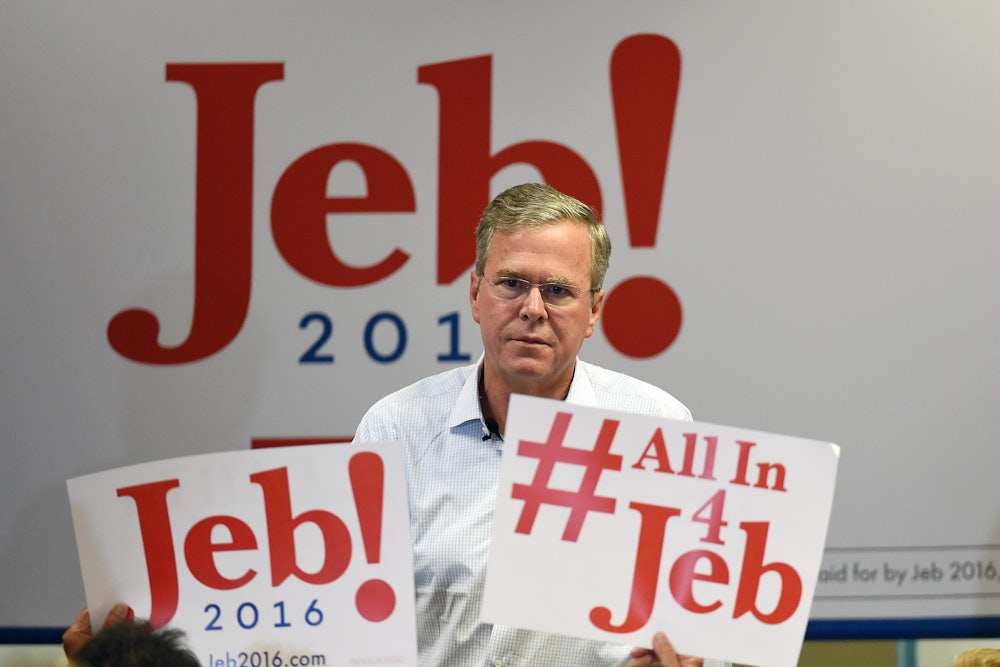In his latest act of hapless desperation, Jeb Bush called for more “regime change” in the Middle East—specifically Syria—during a speech at a country club in Keene, New Hampshire, on Wednesday night.
Bush’s position, which appears to represent a hawkish shift on his part, doesn’t make him an extreme outlier in the presidential race. Hillary Clinton, Chris Christie, Marco Rubio, and John Kasich have all called for a “no-fly zone” to counteract President Bashar al-Assad—a precursor to “regime change,” without the years-long commitment the latter term implies. But Bush has apparently calculated that a full-throated conceptual defense of “regime change” is what the Republican electorate hungers for at this juncture.
A month ago, Bush told CBS News that regime change, wherever the U.S. might attempt it, “ought to be done very cautiously.” But he expressed support only for a no-fly zone and safe zones for refugees and civilians, promising, “We’re not going to have an occupying force in Syria.” After his remarks this week, I asked Bush to clarify his view. “Regime change may not be the right term,” he said. “I think it’s OK, I’m not that politically correct about this.” He continued, “We are changing regimes, that should be the objective.”
Earlier in his address Wednesday, Bush had admonished that the U.S. not be “a warmongering nation”—then called for the nation’s fourth full-scale military engagement against an Arab country in 15 years. This cognitive dissonance could only be made possible by years of self-delusion among Republican consultants and opinion-makers about the GOP base’s sentiment toward the George W. Bush foreign policy legacy. The two leading candidates, Donald Trump and Ted Cruz, have both repudiated that policy, with Trump regularly touting his early opposition to the Iraq War, and Cruz lambasting “neoconservatives” whose views have prevailed within the GOP.
In scrambling for an opportunity to prove that he too can be “politically correct”—without any commensurate reconsideration of the underlying policy deficiencies that have made his candidacy so unpopular—Bush has taken precisely the wrong lesson from Trump. Being “politically correct” is no good if it’s in service of outmoded ideals that have been rejected by large swaths of the party. The most recent CNN poll in New Hampshire showed that GOP voters consider Trump the most credible candidate by far on foreign affairs, belying any notion that his appeal is limited to some raw economic populism—or, indeed, that voters even necessarily take there to be any meaningful distinction between foreign and economic policy.
It was quite something, then, how breezily Bush transitioned
in his remarks from the “regime change” proposal to calls to cut Social
Security benefits for people as old as 50. That might’ve been an unremarkable
tack at a country club filled with New Hampshire’s handful of highbrow
Republican “influencers,” but as the party is fast learning, such a constituency
is helpless before populist and nationalist challengers who hold no brief for
the “entitlement reform” fixation championed by D.C.-oriented consultants.
Indeed, earlier in the week at Concord High School, Donald Trump’s only comment
on Social Security was to declare that he will not be cutting it (he says he’ll
pay for it by revitalizing American industry).
The only fervent Bush supporter I could locate at the country club also happened to be someone who once worked for George H. W. Bush: Patrick Durkin, a financier from Connecticut. Defending the choice of venue, Durkin said, “This is more like a town hall, this is not a fancy club. There’s a golf course, there’s a restaurant, but anybody can come in. It’s not like a rich place.” Maybe so, but try asking the median GOP voter in New Hampshire about a third Bush calling for yet another Middle East invasion from the comfort of a comfy country club, and their response likely won’t be politically correct, either.
